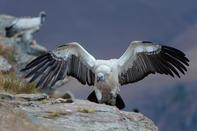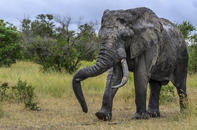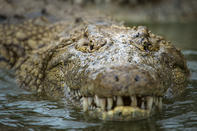The Palace of Vultures
The Waterberg is a wild area three to four hours drive north of Johannesburg. Situated on a high-lying plateau, it has a unique flora and a wide variety of game. One of the major advantages is that it is malaria-free.

Several farms in the Waterberg area have banded together to create a large conservancy. Modimolle is the main town of this region. The Waterberg Range is rich in indigenous trees, streams, springs, wetlands and bird life. Cliffs known as 'The Palace of the Vultures' harbour a large breeding colony of Cape vultures.
Marakele National Park

This park lies in the heart of the Waterberg Mountains and is home to a wide diversity of wildlife due to its location in a transitional zone between the dry western and more moist eastern parts of the province. The terrain comprises mountains, grass-clad hills and deep valleys.
Yellowwood and cedar trees, five-metre-high cycads and tree ferns are some of the plant species you’re likely to encounter. Most of the large game species from elephant and rhino to the big cats are present, as well as a decent bird count, including an enormous colony of endangered Cape vultures.
Waterberg Wildlife and Vegetation

The savannah areas consist of rolling grasslands and semi-deciduous forests, with trees such as mountain syringa and silver-leaf. Indigenous grasses provide good grazing for impala, kudu, klipspringer and wildebeest. Other mammals include giraffe, zebra, white rhino and plentiful predators, notably leopard, hyena, and lion.
Vegetative cliff habitats are abundant due to extensive riverine erosion and many tree species cling to these precipitous areas, including fever and paperbark. Riparian zones are associated with a number of rivers that cut through the berg. These mostly drain to the Limpopo River and offer good habitats for birds, reptiles and mammals that require more water than plateau species, especially crocodile and hippo.
By Justin Fox